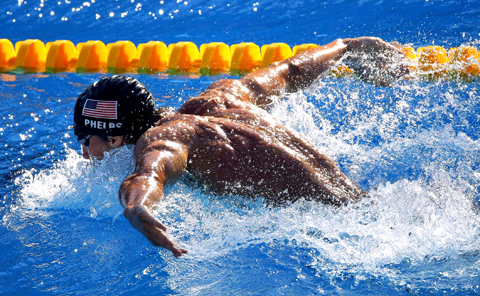Michael Phelps had another swimsuit issue. It didn’t slow him down this time.
Phelps bounced back from a stunning loss with something more familiar — a world record in the 200m butterfly on Wednesday.
For good measure, he surpassed another of Mark Spitz’s accomplishments with the 34th world record of his career, one more than Spitz had during his brilliant run in the pool.

PHOTO: REUTERS
One night after he was soundly beaten by Germany’s Paul Biedermann, Phelps sliced the time in what he calls his “bread and butter” to 1 minute, 51.51 seconds, more than a half-second lower than his gold medal-winning time of 1:52.03 at the Beijing Olympics.
With all the hullabaloo over swimsuits, everyone wondered about Phelps’ decision to wear one that stretched only from his waist to his ankles, leaving his upper body bare. Was he trying to make a fashion statement?
“No, that didn’t even cross my mind,” Phelps said. “It was just me being comfortable.”
Actually, he had planned to wear a Speedo bodysuit, only to discover during warmups the one he brought to the Foro Italico was too tight in the shoulders. So he went back to the legsuit, which he prefers in the fly anyway.
“He actually warmed up with the full body and he just said it felt too tight and he took it off,” Phelps’ coach, Bob Bowman, said. “Then I noticed he hadn’t shaved his chest, but I’m like, ‘Don’t worry about it. I don’t think you have much hair.’”
Phelps went out much faster than he normally does in the fly, and paid for it on the final push to the wall. His arms were burning.
His legs, too. But there was no way he was losing again.
He surged to the wall a body length ahead of silver medalist Pawel Korzeniokski of Poland, with Japan’s Takeshi Matsuda settling for bronze. Phelps whipped around quickly to see his time and held up his right index finger when the “WR” was posted.
“I wanted to step on it in the first 100 to get out there in the clean water, and that’s pretty much what happened,” Phelps said. “It was a lot more pain last night than tonight.”
On Tuesday, he was blown out of the water by Germany’s Paul Biedermann, who routed Phelps in the 200 freestyle and also snatched away his world record.
Most of the talk afterward was about what they were wearing. Biedermann was in a polyurethane Arena X-Glide suit, which everyone concedes produces much faster times than Phelps’ year-old Speedo LZR Racer.
What helped Phelps get over that disappointment was returning to his one reliable race, the 200 fly. That event produced his first trip to the Olympics in 2000 (he finished fifth at Sydney as a 15-year-old). That event produced the first of all those world records in 2001.
“I’ve always done well in it,” he said. “I guess you can call it my bread and butter event.”
Italy’s Federica Pellegrini sent the home crowd into a frenzy when she set the 20th world mark of the four-day-old meet in the 200m freestyle.
Pellegrini, 20, said she was the greatest Italian athlete ever after setting her 10th world record.
She clocked one minute, 52.98 seconds in winning the 200m, breaking her own world record. She also was the first woman to break four minutes in the 400m when she won in 3:59.15 on Sunday.
“Without any false modesty, I didn’t think there were any doubts about that as of a few world records ago. There you have it,” Pellegrini, who won the Olympic 200 last year, said when asked if she was the greatest Italian athlete.
“With today’s world record, I’ve had 10 world records before I’m 21. I’ve won an Olympic gold medal, two world championship gold medals here. So, I think so,” she told a news conference.
“I feel that my heart is for Italy,” she said after clapping along with the crowd during her country’s bouncy national anthem, Fratelli d’Italia (Brothers of Italy).
Pellegrini, who enjoys celebrity status in Italy, said she was “destroyed physically and psychologically” after the two events.
Pellegrini, who also won an Olympic silver medal in the 200m in 2004, said she had trained with men since she was 14, a regime she called “mind-blowing, women can’t keep up.”
“In training, I can’t beat the men, but I can come close. 1:52 in the 200, that’s almost a man’s time. 3:59, not yet,” she said.
Pellegrini was to swim the 4x200m freestyle relay yesterday and then take a vacation after what she called “the air bubble” of the championships.
Before the night was done, South Africa’s Cameron van der Burgh broke the mark he set in the semi-finals to win the 50m breaststroke, and China’s Zhang Lin took down Grant Hackett’s four-year-old record in the 800 free by more than six seconds (7:32.12), with Tunisia’s Ous Mellouli also going under the old mark but only getting silver.
Both are non-Olympic events.
Earlier, Germany’s Daniela Samulski and Russia’s Anastasia Zueva got things rolling by setting records in consecutive semi-finals of the 50m backstroke, another event not on the Olympic program. And American Mary Descenza took more than three seconds off her personal best to swim the fastest women’s 200m butterfly ever — in the morning preliminaries, no less.
For those who’ve lost count, that’s 22 records in Rome, hardly living up to the label as the Eternal City. Nothing is sacred in these suits, which have already helped surpass the 15 records set at the last worlds in Melbourne two years ago, with four days still to go.
Phelps had been eager to get another shot at the 200m fly on the big stage, even after winning gold in China. During the Olympic race, his goggles filled with water and he actually had to count his strokes in his head because he couldn’t really see where he was. He was disgusted afterward.
“That’s something I really wanted to do last year, break the 1:52 barrier,” he said.
Was redemption on his mind as well?
“Not really,” Phelps insisted. “I’ve always been able to put races behind me, having to do so many events. You can’t get caught up with one event.”
That said, Phelps couldn’t wait to get on the podium to collect his first individual title of the meet. While his name was being announced in English and Italian, he stood impatiently with his right foot already on the stand.
Finally, Phelps hopped up to the highest rung, thrust both arms in the air with a defiant look that melted into a crooked smile.
Then he plunged into the stands to hug his mother, Debbie, just as he did the night before.
No consoling this time. Only a celebration.

Shohei Ohtani and Clayton Kershaw on Friday joined their Los Angeles Dodgers teammates in sticking their fists out to show off their glittering World Series rings at a ceremony. “There’s just a lot of excitement, probably more than I can ever recall with the Dodger fan base and our players,” manager Dave Roberts said before Los Angeles rallied to beat the Detroit Tigers 8-5 in 10 innings. “What a way to cap off the first two days of celebrations,” Roberts said afterward. “By far the best opening week I’ve ever experienced. I just couldn’t have scripted it any better.” A choir in the

After fleeing Sudan when civil war erupted, Al-Hilal captain Mohamed Abdelrahman and his teammates have defied the odds to reach the CAF Champions League quarter-finals. They are today to face title-holders Al-Ahly of Egypt in Cairo, with the return match in the Mauritanian capital, Nouakchott, on Tuesday next week. Al-Hilal and biggest domestic rivals Al-Merrikh relocated to Mauritania after a power struggle broke out in April 2023 between the Sudanese army and a paramilitary force. The civil war has claimed tens of thousands of lives and displaced more than 12 million people, according to the UN. The Democratic Republic of the Congo-born Al-Hilal

The famously raucous Hong Kong Sevens are to start today in a big test for a shiny new stadium at the heart of a major US$3.85 billion sports park in the territory. Officials are keeping their fingers crossed that the premier event in Hong Kong’s sporting and social calendar goes off without a hitch at the 50,000-seat Kai Tak Stadium. They hope to entice major European soccer teams to visit in the next few months, with reports in December last year saying that Liverpool were in talks about a pre-season tour. Coldplay are to perform there next month, all part of Hong Kong’s

Shohei Ohtani, Teoscar Hernandez and Tommy Edman on Thursday smashed home runs to give the reigning World Series champions the Los Angeles Dodgers a 5-4 victory over Detroit on the MLB’s opening day in the US. The Dodgers, who won two season-opening games in Tokyo last week, raised their championship banner on a day when 28 clubs launched the season in the US. Dodgers manager Dave Roberts shuffled his batting lineup with all four leadoff hitters finally healthy as Ohtani was followed by Mookie Betts, then Hernandez and Freddie Freeman in the cleanup spot, switching places with Hernandez. “There’s a Teoscar tax to